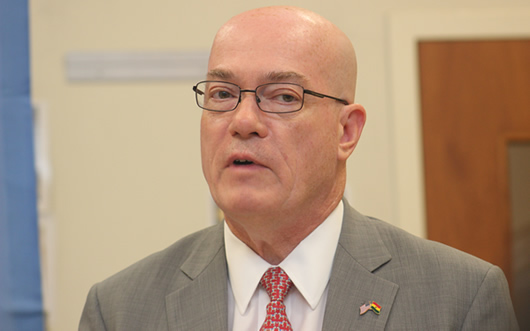
Robert P. Jackson – US Ambassador to Ghana
Mr Robert P. Jackson, the United Sates Ambassador to Ghana has urged the government of Ghana to take concrete steps to rein vigilante groups who answer to powerful individuals rather than the of rule law.
He said President Nana Addo Akufo Dankwa Akufo-Addo’s administration rode to power on a message of fighting corruption; and therefore, he was encouraged by the President’s unequivocal declaration in April that impunity would not be tolerated under his watch.
Mr Jackson made the appeal in his address during the inauguration of the African Centre on Law and Ethics at the Ghana Institute of Management and Public Administration (GIMPA) in Accra.
The Centre was established by the GIMPA Faculty of Law in collaboration with the Fordham Law School and the law firm of White and Case.
He said the Centre could transform judicial and legal ethics – nurturing a model of moral and ethical integrity that could be replicated throughout West Africa.
Speaking on ethics and corruption, Mr Jackson said some amount of self-examination could have prevented the shameful 2015 bribery scandal involving dozens of judges and judicial staff in Ghana.
“Not one of whom, I feel compelled to point out, has been brought to justice,” the Ambassador declared.
“As the exposé by Mr Anas shows, more often than not, it is not introspection that shines the light on our shortcomings – it is inspection from outside.
“Nevertheless, instilling the principles of ethics, transparency and accountability into the training of young legal professionals – as this Centre plans to do – will go a long way,” he added.
Adding that he believed this sort of healthy self-awareness could take root here in Ghana.
Mr Jackson said within the next few weeks or months, Ghana’s Parliament would be set to debate a bill being crafted by the Office of the Attorney General (AG) that would create an Office of Special Prosecutor focusing on corruption – related crimes.
He said the US Embassy was sponsoring a handful of Attorneys from the AG’s Office to travel to New York and Washington, so that they could study special prosecution offices in the US and incorporate best practices in Ghana.
“My hope is that, once established, the Special Prosecutor might be granted the freedom and latitude to prosecute cases independent of political and social influence.
“My hope is that no one, including not one of the judges implicated by Anas, would be too powerful or influential to escape prosecutor’s scrutiny,” he said.
He said the US welcomes Ghana’s moves towards judicial professionalism; stating that “Through our Security Governance Initiative, and working in partnership with the Attorney General and the USAID, we hope to implement a case tracking”.
“Courts will be able to use this system to bring transparency and efficiency to the legal process, reducing opportunities to collect ‘facilitation fees’ in exchange for expediting or burying cases.”
Professor Philip Duku Osei, the Deputy Rector, GIMPA, recounted that GIMPA had made significant progress since its establishment in 1961 as one of the key strategic institutions to develop the public administrative system, to provide civil servants with administrative and professional competence, and to plan and administer national, regional and local services.
He said the Institute, which attained a fully-fledge university status in 2004, would from next academic year introduce the School of Liberal Arts and Social Sciences.
Mr Ernest Kofi Abotsi, Dean, GIMPA Faculty of Law, said GIMPA was the first university in Ghana to set up a Centre for Law and Ethics; stating that in the midst of ethics, corruption and graft do not thrive.
“Law doesn’t work where ethics is absent,” the Dean said.
Dr Nightingale Rukuba-Ngaiza, Senior Counsel, Africa, Middle East and North Africa Practice Group, World Bank Group, said the work of the Centre would transcend the legal profession to other areas such as good governance and the public sector.
Mrs Justice Georgina Theodora Wood, former Chief Justice, who chaired the function, said the Legal Ethics Training Programme would offer law students a unique opportunity to discuss legal ethics and standards of professional practice with practitioners and legal experts from Ghana and around the world.
She said legal ethics was crucial for distinguishing between what was right and wrong.
Mrs Elizabeth Black, Global Manager of Social Responsibility, White and Case, said legal ethics was crucial to a healthy functioning society.
Source: GNA























